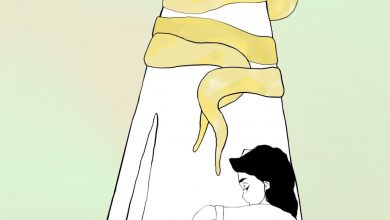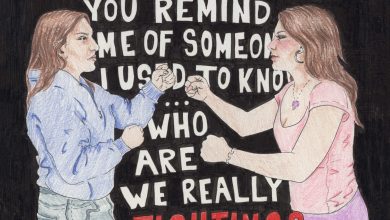Building a Community of Sluts by Unslutting

I confided in good friends recently about my most recent relationship break up. They have prior knowledge that these sorts of things happen to me all too frequently, and I know they’re just as tired of people breaking up with me as I am. As a good friend, I know they feel comfortable in laying down their personal opinion with me, which I usually appreciate. My friends hypothesized that a potential reason for why my relationships have been failing is because I sleep with the people I am dating too early. From a concerned friend’s point of view, I can see where they are coming from. I get emotionally attached to people that I sleep with, particularly with those that I date. Because I get attached, I get hurt. I know my friends are tired of me getting hurt all the time, as am I.
But when they further justified their claim and said to me, “Guys don’t want to be with girls long-term that give it up so quickly. Why would he want to wife the ho, when the ho keeps giving him what he wants?”
At first, I didn’t know what to say. I politely told them I strongly disagreed with their perspective, and went on to defend the people I slept with, saying that I knew that they did value me, they respected me, and that they didn’t see me as some dispensable “whore.” There was meaning to this sex, I argued. I just left it at that, feeling baffled and embarrassed. A couple hours later, I grew very frustrated. It was not until a bit later that I realized my friends were essentially calling me a slut. I couldn’t believe it. Finally, it happened to me personally. I was slut-shamed.
The concept of being a “slut” is one of the most powerful insults used against women for having too much sex. It has historically been used in instances such as the Salem Witch Trials in 1692 as a weapon against morality and good virtue, and it still permeates how people perceive women with an active sexual lifestyle. It is even used to describe women that are not sexually active at all, or only a little bit, or just “look” like they are. The rationale that my friends used to slut-shame me seemed like an easy fix to a pressing problem, under the assertion that it was okay to call me a “ho” and make me feel worse about even trying to establish a long term relationship with someone. It wasn’t comforting, especially when I already felt low about, yet again, another failed tryst at love. I grew frustrated at the guy I last had sex with, because somehow he demoted me to this new “ho” status. I wasn’t called a “ho” after sleeping with the last three guys I had been with. But somehow, maybe I finally crossed the territory of “ho-dome” at guy number four. But mostly, I grew frustrated for not defending myself. I had the opportunity to defend my choices to have sex with men “too early”—I’ve only slept with men I genuinely liked or had an interest in pursuing a relationship with! But even THIS train of thought is problematic. It suggests that sex with emotion is the only thing that saves me from being a “ho.” What if in the future I wanted to have sex just for the physical sake of having sex? Would that make me more of a “whore?”
Just recently, Emily Lindin launched the Unslut Project on Tumblr (unslutproject.tumblr.com), which chronicles the slut-shaming she received as an eleven-year-old in middle school in the ‘90s.
This project unveils the severity of how our slut-shaming culture permeates young women’s attitudes, discourages them from establishing a command of their own sexuality, and damages a young person’s self-esteem.
The first blog entry discusses how the slut shaming began: Emily makes out with Zach at a dance, and later goes to “third base” with him. They continue a sexual relationship throughout the school year, where false allegations of what they were actually doing sprouted forth. It got so severe, that many of her female friends did not want to hang out with her anymore; you know, typical middle school drama style. Later on in the year, Emily achingly writes in her journal, “ I can’t dump him now, because then people would think I am even more of a slut than they already do. How could one mistake cause my life to crumble like this?”
The eleven year old in Emily resonated so well with what I was experiencing as a college student. While Emily asserts that she regrets her choice to go to “third base,” I did not initially feel like my decision to have sex was a mistake, but my friends were now making me feel this way. I could also sense that they were tired of me talking about my love life. Because they have slut-shamed me, I feel like I have no more safe spaces to turn to talk about these things. I am afraid of disappointing them and letting them down. When these men left me, my biggest fear soon became that I would also lose my friends, all because I was “a slut.”





I have some pretty hefty opinions on sult-shaming, but in an effort to keep this brief I’ll concentrate on one thing most people overlook when they feel shamed. First of all, your friends did go about “giving you advice” the wrong way, and you can defend yourself all you want, but they’re entitled to keep or change their opinion as they please. In the end, the only thing you have control over is evaluating whether these friendships are worth your time and effort. Now, what they described as not “want[ing] to wife the ho” is what I would descibe as the conquering personality – a personality or sexual preference to get what one wants and get out. There are plenty of individuals (both male and female) who have this type of personality, and if that’s the type of person he or she aspires to be or feels like being in the moment then he or she has the right to be (as long as what’s taking place is consensual of course). This good-for-her comment brings me to my main point, the thing most people overlook when feeling shamed, which is you should feel comfortable about your sexuality and sexual decisions before engaging in any type of sexual activity. Ok that’s a complicated sentence without any background. I understand that many of are products of our upbringing, and sometimes our environments have more than suppressed our ability to express our desires properly and openly. However, as someone with the opportunity to go to college, especially a more open campus such as UCLA, and someone who works for a feminist magazine, you should have the inner strength and sense to tune out the world for a minute or two and ask yourself important questions about yourself. For example, why did I feel hurt when this relationship ended? What do I want out of a relationship? Why do I want to have sex with this person? Do my actions match my goals and values? Why or why not? This last question is why I think you feel hurt after “another failed tryst at love.” It’s ok to feel hurt, rejection stings, and some people are more allergic than others. It seems though from your words in this article that your hurt is beyond rejection, and is stemming from a more inner conflict of interests. In other words, you’re not honest with yourself about who you are and want to be as a person. Remember, too, that there is as much pressure in today’s society to be sexually free and open as there is to be chaste and virginal. This inner conflict is probably why you’re feeling tired, and why your friends are feeling tired listening to you. This inner conflict often leads to complaining instead of reflection and action to try another solution. To be honest, this article just seems like a complaint. Yes, slut-shaming exists. Yes, our closest friends do it too. Yes, we can try and inform them how shaming develops from inequalities in our society and how we need to move past that. Maybe they’ll listen, maybe society will slowly change before our wonderful lives are over. BUT if you keep doing the same thing, you’ll keep getting similar results. Sometimes a personal tune up is necessary, listen to what you’re trying to tell yourself, and maybe you won’t feel so tired anymore.
Just to clarify, what we called “third base” wasn’t oral sex. Here’s the entry that describes the actual event: http://www.unslutproject.com/post/48620049522/but-he-was-on-top-of-me-and-i-didnt-want-to-disappoint
There is saying “Changes will start on yourself”. So if you really want to stop calling you like that, then time to fix yourself.
Hi Emily! Thank you for your response. The editor mistakenly assumed “third base” was oral sex. Sorry about that! We have fixed the error!